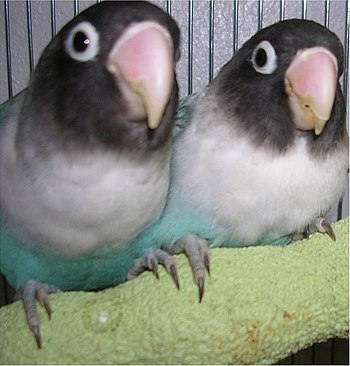 |
| English: Black-masked lovebird (Agapornis Personata) with cobalt color mutation (Photo credit: Wikipedia) |
 |
| The blue mutant of the Masked Lovebird Agapornis personata. This variety is called blue Masked Lovebird. (Photo credit: Wikipedia) |
By Jennifer Manning
You've probably seen these gorgeous birds in your local pet store. They are the miniature green parrots with the big expressive eyes. Love Birds are a good choice for someone who wants a parrot, but doesn't want the commitment that a large parrot requires. A large parrot such as a Macaw can live for 60 or more years, while a Love Bird seldom lives more than 15 years.
Before you go out to buy a Lovebird, you should be aware of what you're getting into. Lovebirds, like all parrots, are relatively high maintenance pets and therefore require a dedicated and special type of pet owner. Here are some important factors to keep in mind.
Companionship
Love Birds, like all parrots, are extremely social creatures and crave the company of others. If you don't have a few hours to spend with him every day, then you'll need to buy another lovebird to keep him company. Without the companionship of humans or another bird, your bird is likely to exhibit problem behavior such as extreme aggression, excessive preening and constant squawking.
Choosing The Right Lovebird
An ideal lovebird will be 6 to 10 weeks old and hand--fed. A young, hand--fed bird is much easier to tame and train than an older, parent--fed lovebird. The most commonly available species are:
Peach Face - This species is usually green, with a peach head, face and neck.
Fischer's Lovebird - This bird has a green body with shades of yellow and orange on their head and neck.
Masked Lovebird - This bird has a green body, with a dark brown colored brown mask around their face and neck. Just below this mask is a yellow band of feathers.
Housing
Love birds require a large cage with plenty of room to stretch out their wings and play -- obviously a pair will require a larger cage than a single bird. The majority of the cage bars should be horizontal and there needs to be a few perches located at varying levels. Place plenty of toys in their cage to keep them stimulated.
Health
Love Birds require daily exercise to keep them healthy. This means you should let them out to fly every day in a safe room. Make sure there are no open windows or predators (such as dogs or cats) in this room.
You should feed your love bird a quality parrot seed mix and plenty of fresh, clean fruits and vegetables that are bird--safe. This will give them a good variety that matches what they might find in the wild. You'll need to remove any uneaten food every day.
Learn more about Love Birds at http://www.petcarejournal.com/love-birds.html - a website designed to provide you with pet articles and resources that will help you get the most out of your pet keeping experience, no matter what type of pet you own.
Article Source: [http://EzineArticles.com/?Love-Birds---What-Does-it-Take-to-Care-For-These-Special-Pet-Birds?&id=1248960] Love Birds - What Does it Take to Care For These Special Pet Birds?






Very good information is given in this blog..A2Z Pets Mania is first of its own type pets services provider in Dehradun.We are the Best Breeders in Dehradun Uttarakhand.We sale and purchase all the pet breeds of dogs, birds and cats and also deals in pets accessories, pets foods and pets clinic services in Dehradun..Everyone likes to have pets, if you want to keep it,
ReplyDeletethen we are the best pet's shop and best breeders in Dehradun,Uttarakhand(India).